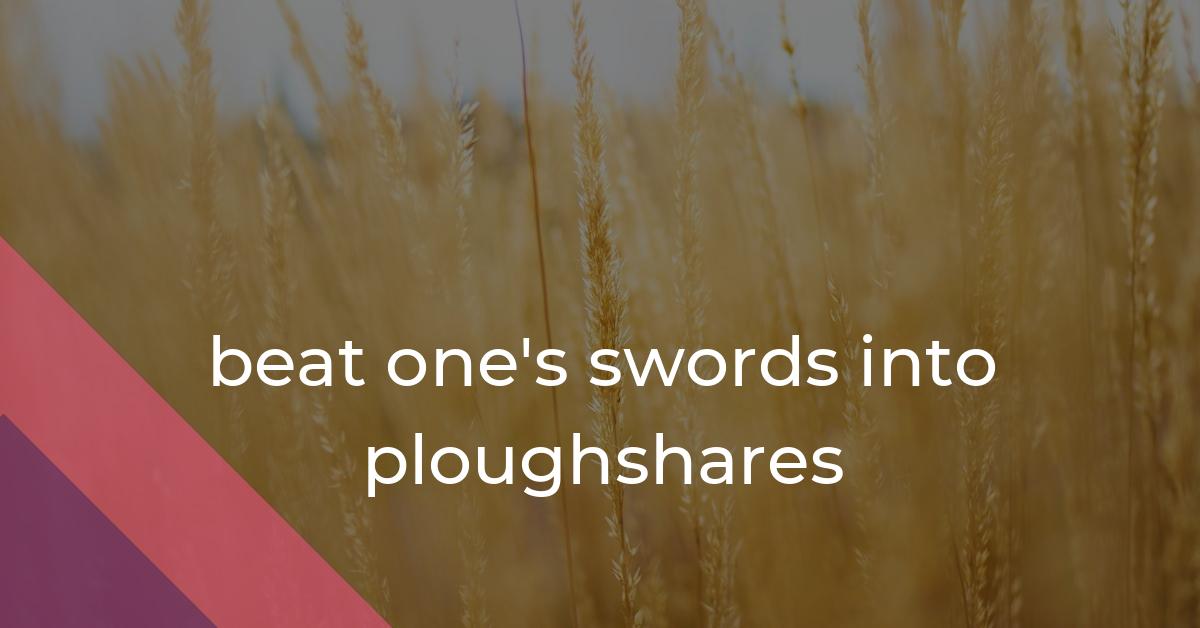beat one’s swords into ploughshares: Idiom Meaning and Origin
What does ‘beat one's swords into ploughshares’ mean?
The idiom beat one's swords into ploughshares means to stop using weapons and start using them for peaceful purposes, like agriculture, highlighting the importance of peace and non-violence over war and conflict.

Idiom Explorer
The idiom "sheathe the sword" means to withdraw from a conflict or to end hostilities. It derives from the act of putting a sword back into its sheath, symbolizing the cessation of aggression or violence.
The idiom "cross swords" means to have a conflict or engage in a fierce argument or disagreement with someone.
The idiom "come to blows" means to engage in a physical fight or altercation.
The idiom "come out swinging" means to begin a competition or argument with great force or determination. It is often used to describe someone who starts a fight or confrontation aggressively and forcefully.
The idiom "choose violence" means to deliberately opt for an aggressive or confrontational approach to a situation, often as a means of resolving conflicts or getting one's way.
The idiom "catch hands" means engaging in physical combat or getting involved in a fight.
The idiom "butter one's bread on both sides" means to take advantage of a situation or opportunity to benefit oneself in multiple ways rather than just one.
The idiom "bring to bear" means to apply or use something effectively or forcefully in order to achieve a desired result.
The idiom "bring a knife to a gunfight" means to enter a situation without being adequately prepared or equipped, and thus have little chance of success or survival.
Sword's Unexpected Metamorphosis
The idiom "beat one's swords into ploughshares" has its origins in the Bible, specifically in the Book of Isaiah. In this passage, it is mentioned that people will beat their swords into plowshares and their spears into pruning-hooks, signifying a transformation from conflict and war to peace and productivity.
Metaphorically, this idiom represents the idea of turning something destructive or negative into something helpful or positive. The word "swords" symbolizes weapons and violence, while "ploughshares" represent agriculture and productivity. The idiom emphasizes the conversion of destructive forces into constructive ones, urging a more peaceful and harmonious approach to resolving conflicts.
This phrase highlights the concept of repurposing existing resources and skills. It suggests that individuals or societies should utilize their talents and resources for beneficial purposes rather than for destructive or harmful endeavors.
Throughout history, the idiom "beat one's swords into ploughshares" has been used in various contexts to promote peace, disarmament, and the significance of productive endeavors over conflict. Political speeches, literature, and artwork have all employed this idiom to convey the values of peace and the pursuit of positive change.
Although the idiom originated from religious text, it has also gained recognition in secular contexts. It is now widely acknowledged as a symbol for peace and the repurposing of resources for the greater good.
By metaphorically beating swords into ploughshares, we are reminded of the possibilities for positive change and the importance of using our skills and resources for the betterment of humanity.
("beats one's swords into plowshares" is an alternative form of the idiom "beat one's swords into ploughshares." The slight variation in wording does not change the meaning or intent of the idiom.)
Another related idiom is "sheathe the sword." It is used to convey the idea of putting an end to conflict or hostility. When someone "sheathes the sword," they are choosing not to engage in violence or aggression. This idiom emphasizes the importance of peace and non-violent resolutions.
Additionally, "cross swords" is another idiom related to "beat one's swords into ploughshares." It is often used to describe a conflict or argument between two parties. However, when viewed in the context of "beat one's swords into ploughshares," the idiom takes on a different meaning. Instead of promoting conflict, "cross swords" serves as a reminder of the need to resolve conflicts peacefully and harmoniously.
It is important to remember that idioms are expressions or phrases whose meaning may not be immediately obvious by looking at the individual words. Understanding the origin and context of idioms helps to provide a deeper understanding of their meaning and significance.
Overall, the idiom "beat one's swords into ploughshares" and its related idioms convey messages of transforming destructive forces into productive ones, promoting peace, repurposing resources, and resolving conflicts in peaceful and harmonious ways. By employing these idioms in our language and promoting their values, we can inspire positive change and encourage a more peaceful and productive society.
Example usage
Examples of how the idiom "beat one's swords into ploughshares" can be used in a sentence:
- After the war, the country focused on beating their swords into ploughshares by investing in agriculture and rebuilding infrastructure.
- The renowned artist decided to beat his swords into ploughshares by shifting his artistic focus from war-themed paintings to landscapes depicting peaceful scenes.
- Instead of wasting resources on military spending, the government chose to beat their swords into ploughshares by allocating funds towards education and social welfare programs.
More "Peace" idioms



